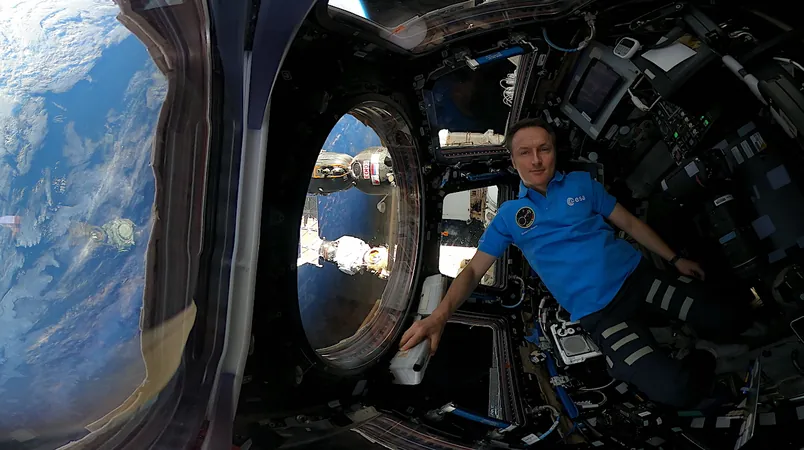
Unlocking the Mysteries of Space: How NASA's Biology Research is Paving the Way for Safer Human Exploration
2025-04-07
Author: John Tan
NASA's groundbreaking research in space biology is revolutionizing our understanding of how living organisms react to the rigors of spaceflight, ultimately making deep-space travel safer for humans. With significant funding for innovative studies, scientists are delving into the biological mechanisms that are activated by microgravity, radiation, and other extraterrestrial conditions. This research is not only pivotal for long-term human exploration of the cosmos but also provides insights that can impact life on Earth. Here’s a closer look at how NASA's space biology research is making waves:
Microgravity's Impact on Cellular Functions
In the weightlessness of space, typical biological processes like cell division, gene expression, and tissue repair are significantly disrupted. Researchers are utilizing model organisms—such as plants, microbes, and even small mammals like mice—to unravel how these changes occur. Notably, investigations involving Arabidopsis plants aboard the International Space Station (ISS) have uncovered alterations in root growth, suggesting that the absence of gravity fundamentally modifies plant development at the molecular level. This research is crucial for developing resilient crops that are fit for cultivation in extraterrestrial environments.
Assessing the Dangers of Deep Space Radiation
Beyond Earth’s protective magnetic shield lies a barrage of cosmic rays and solar radiation that pose severe risks to human health, including DNA damage and heightened cancer risks. NASA-funded investigations are simulating space radiation to comprehend how human cells manage repairs—or fail to do so. Studies utilizing human cell cultures reveal that exposure to high-energy particles can disrupt key DNA repair mechanisms, specifically the p53 protein pathway, which is vital for correcting genetic mutations. Insights gained from these experiments could lead to the development of protective measures, such as advanced pharmaceuticals or innovative shielding techniques, to safeguard astronauts venturing to the Moon and Mars.
Microbial Behavior in Space Environments
Spaceflight affects not just the human body, but also the microorganisms that accompany astronauts into space. Research indicates that the microgravity condition, coupled with oxidative stress, can provoke some bacteria to become more virulent and develop antibiotic resistance. Meanwhile, experiments show how environmental stressors in spacecraft can alter the composition of the microbial communities. These findings are critical, as harmful microbes can establish themselves, leading to potential risks for both astronaut health and spacecraft integrity. Understanding how these microbial biofilms evolve and interact with antibiotics can offer novel solutions applicable to challenges on Earth, as well as provide preventive techniques for long-duration missions.
The Challenge of Musculoskeletal Decline
In the absence of gravity, astronauts experience bone thinning and muscle atrophy, akin to an accelerated form of osteoporosis. NASA's funding supports advanced research using stem cells and 3D tissue cultures to unveil how mechanical unloading reshapes essential signaling pathways associated with bone health, particularly those involving osteoblasts (the cells responsible for bone formation). Recent findings indicate that microgravity suppresses Wnt signaling, a critical pathway for maintaining bone density. This knowledge could pave the way for developing therapeutic interventions to keep astronauts' bones robust during extended stays in space.
These research initiatives extend beyond the realm of academic curiosity; they serve as a foundation for understanding health impacts observed over decades of space exploration. The revelations emerging from space biology research are crafting a comprehensive strategy for ensuring human health on the Moon, Mars, and beyond, while simultaneously enriching our understanding of aging, disease, and adaptation right here on Earth. As we venture further into the cosmos, NASA's work is not just about exploring new frontiers but also about safeguarding human health against the unknown challenges of space.
The Future of Space Biology: A Dual Benefit for Earth and Beyond
As we continue to search for answers about life beyond our planet, NASA's space biology research will play a crucial role in preparing humanity for journeys to the stars. By understanding these cosmic challenges, we're not only making space exploration feasible but also unlocking secrets that could benefit life on Earth, ensuring a healthier future for all. Stay tuned for more updates as we dive deeper into the universe!



 Brasil (PT)
Brasil (PT)
 Canada (EN)
Canada (EN)
 Chile (ES)
Chile (ES)
 Česko (CS)
Česko (CS)
 대한민국 (KO)
대한민국 (KO)
 España (ES)
España (ES)
 France (FR)
France (FR)
 Hong Kong (EN)
Hong Kong (EN)
 Italia (IT)
Italia (IT)
 日本 (JA)
日本 (JA)
 Magyarország (HU)
Magyarország (HU)
 Norge (NO)
Norge (NO)
 Polska (PL)
Polska (PL)
 Schweiz (DE)
Schweiz (DE)
 Singapore (EN)
Singapore (EN)
 Sverige (SV)
Sverige (SV)
 Suomi (FI)
Suomi (FI)
 Türkiye (TR)
Türkiye (TR)
 الإمارات العربية المتحدة (AR)
الإمارات العربية المتحدة (AR)